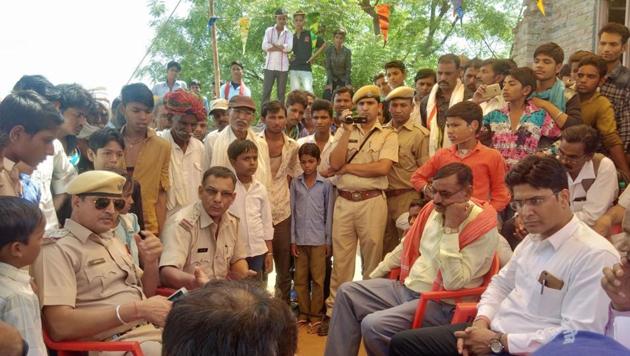Dalit groom, a cop, rides mare in pre-wedding procession, gets threats from Gurjars
Police force was deployed at Sangaoda, 10 km from Bundi, for the safety of the groom and his family members who were preparing for the wedding due on Friday evening
A Dalit groom, who is a police constable, is receiving threats from the Gurjar community after he took out his ‘bindori’ (pre-wedding procession) on a mare through Sangaoda village in Rajasthan’s Bundi district, a first in 70 years.

Police force was deployed at Sangaoda, 10 km from Bundi, for the safety of the groom and his family members who were preparing for the wedding due on Friday evening.
The entire scheduled caste community came together to ensure that the constable, Banwari Lal Meghwal, would take out his bindori through the village, said Ramraj Meghwal, ditrict president of the Balai Samaj Sewa Sansthan.
For the Dalits it became an issue of self-respect that even so long after independence and being given equal rights in the constitution, “our community is discriminated against” by upper castes.
“Since independence, this was the first bindori taken out on a mare by a Dalit bridegroom in the village,” said Babulal Verma, president of the Dr Bhimrao Ambedkar Kalyan Samiti, Bundi.
Defying tradition and upper caste opposition, Banwari Lal, 25, took out his bindori on Thursday evening and since then he and his family are living in fear instead of enjoying the wedding ceremonies.
Banwari Lal, the first from his village to get a government job, said he and his relatives and friends are receiving threats from the Gurjars. “No Dalit in my village had taken out a Bindori on a mare. I thought I should break that tradition. I got help from the administration too,” he said.

Banwari Lal fears that the upper castes might try to harm him or his family after the security is removed.
“I request senior police officials to set up a police outpost in my village as the Dalits are unsafe here,” he said. His bride-to-be is Pooja Meghwal from a nearby village, who is doing her graduation.
According to Verma, she too called up Banwari Lal and told him that if he did not take out the bindori on the mare through the village, she would cancel the wedding.
Sangaoda village situated at the confluence of three rivers with forested area around is populated by Gurjars and scheduled castes, such as Meghwals, Kumhars and Kahars. Gurjars are in a majority.
Banwari Lal said he had given an application to the police department on May 1 seeking security for his bindori through the village, a pre-wedding ritual in which the groom takes out a procession on a mare through the village. Grooms from the Dalit community in many areas of Rajasthan are prohibited from sitting on a mare and have to take out bindori on foot.
Verma said during the bindori, some police officials asked Banwari Lal to not pass in front of the Devnarayan temple where Gurjars pray. “We protested and then the senior administration officials came and assured us that we could take out the Bindori through the entire village.”
Sadar police station SHO Anil Kumar Joshi said there was no opposition from the Gurjars and the bindori had passed peacefully. He said no complaints had been filed against any Gurjar from the village.
Kishan Lal Gurjar, a resident of the village, said Gurjars had not opposed the bindori. “Banwari Lal sought protection after which the administration held meetings with all communities in which we said that we have no opposition,” said Gurjar who runs a dairy booth in Bundi.
Verma said a few days before the bindori, the SDM had warned 16 Gurjars named by police against creating any nuisance during the bindori. Verma said the Gurjar community had been holding meetings before the bindori and voicing opposition to it. He said the Gurjars wanted that the bindori should be taken out only through the Dalit area and not through the entire village.
“We have written to the district administration, home minister and Scheduled Castes Commission that if any violence takes place against the Dalits, then the district administration will be responsible because we have apprised them of the situation,” he said.
As per the NCRB data, Rajasthan is among the states with the highest number of cases of atrocities against scheduled castes and scheduled tribes.






